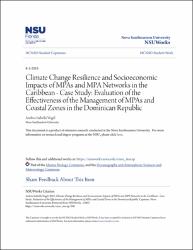/admin/item?itemID=5346c097-4485-454b-882a-4d911d7f6286
Climate change resilience and socioeconomic impacts of MPAs and MPA networks in the Caribbean. Case study: evaluation of the effectiveness of the management of MPAs and coastal zones in the Dominican Republic

View/
Type of Access
OpenMaterial Type
TextType of Content
ThesisSubject
Recursos naturales - República DominicanaRecursos marinos
Áreas protegidas - República Dominicana
Cambio climático
Impacto ambiental
Conservación ambiental
Language
EnglishCollection
- Investigación ambiental [1743]
Metadata
Show full item record| Abstract: | Many Caribbean nations have established marine protected areas (MPAs) to preserve marine biodiversity and maintain their economically important marine resources. In some Caribbean nations, in particular the Dominican Republic, most MPAs have failed in these respects and have remained “paper parks” due to being modeled along traditional conservation lines without careful consideration of socioeconomic factors, good management practices or increasingly important climate change factors. Successful Caribbean MPAs and MPA networks effectively function as refuges, attractions, sources of socioeconomic development and ecosystem-based climate change resilience mechanisms. |
| Author(s): | Vogel, Andrea Isabella
|
| Date: | 2015 |
| Published: | Florida: Nova Southeastern University |
| Citation: | Vogel, A. I. (2015). Climate change resilience and socioeconomic impacts of MPAs and MPA networks in the Caribbean. Case study: evaluation of the effectiveness of the management of MPAs and coastal zones in the Dominican Republic. Capstone. Florida: Nova Southeastern University. Recuperado de: |
| URI: | https://bvearmb.do/handle/123456789/2287
|

